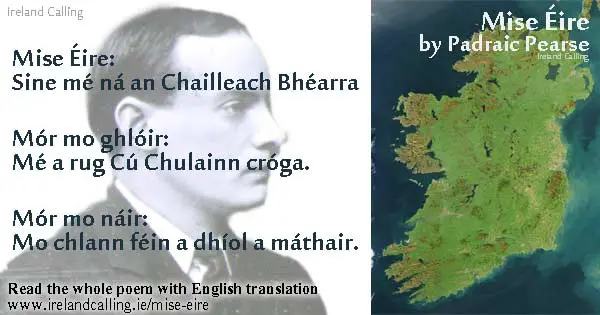Mise Éire by Padraic Pearse is a poem written in Irish about nationalism. There is an English translation at the bottom of the page. Sean O’Riada’s film, based on the poem, is further down the page.
Pearse was a tireless writer and activist in Ireland’s attempt to get independence from the British government. He was one of the key members of the Easter Rising in 1916 and his passion for Irish independence cost him his life when he was executed by the British.
Click here for the English translation

Mise Éire
Mise Éire:
Sine mé ná an Chailleach* Bhéarra
Mór mo ghlóir:
Mé a rug Cú Chulainn cróga.
Mór mo náir:
Mo chlann féin a dhíol a máthair.
Mór mo phian:
Bithnaimhde do mo shíorchiapadh.
Mór mo bhrón:
D’éag an dream inar chuireas dóchas.
Mise Éire:
Uaigní mé ná an Chailleach* Bhéarra.
* an Chailleach is an old woman meaning a ‘witch’
I am Ireland
I am Ireland:
I am older than the old woman* of Beare.
Great my glory:
I who bore Cuchulainn, the brave.
Great my shame:
My own children who sold their mother.
Great my pain:
My irreconcilable enemy who harrasses me continually…
Great my sorrow
That crowd, in whom I placed my trust, died.
I am Ireland:
I am lonelier than the old woman of Beare.
* old woman meaning a ‘witch’

What is the story of Mise Eire?
In the poem Mise Eire, Pearse is expressing his love of – and his pride in – Ireland’s culture and heritage. He reflects on the problems faced by his country as well is his hopes and fears about what the future might bring.
The 1959 film Mise Éire
Sean O’Riada’s film Mise Éire, had its world premiere at Cork Film Festival.
Mise Éire (I am Ireland), is a film based on the poem by Padraic Pearse.

